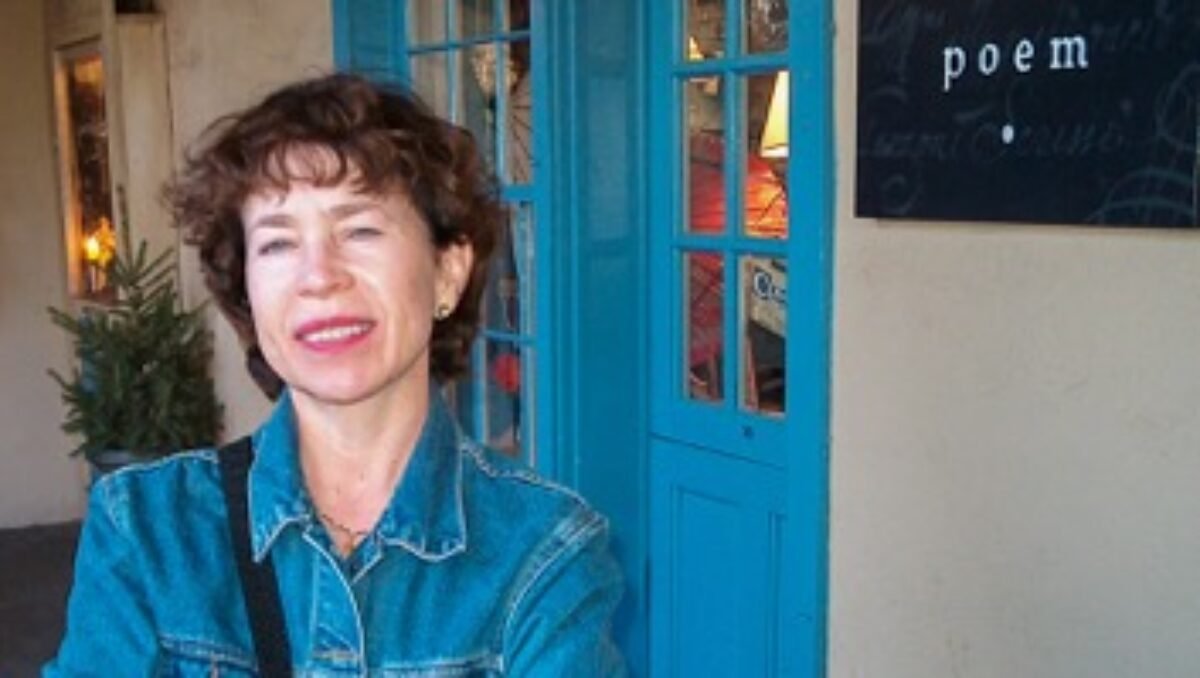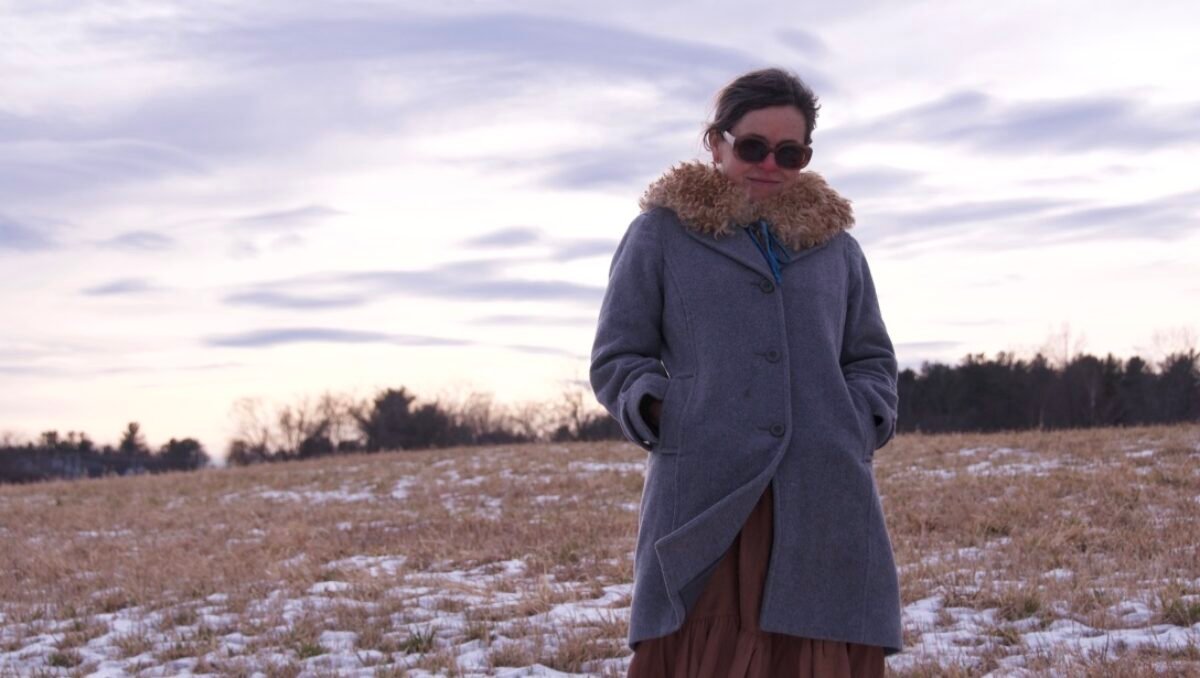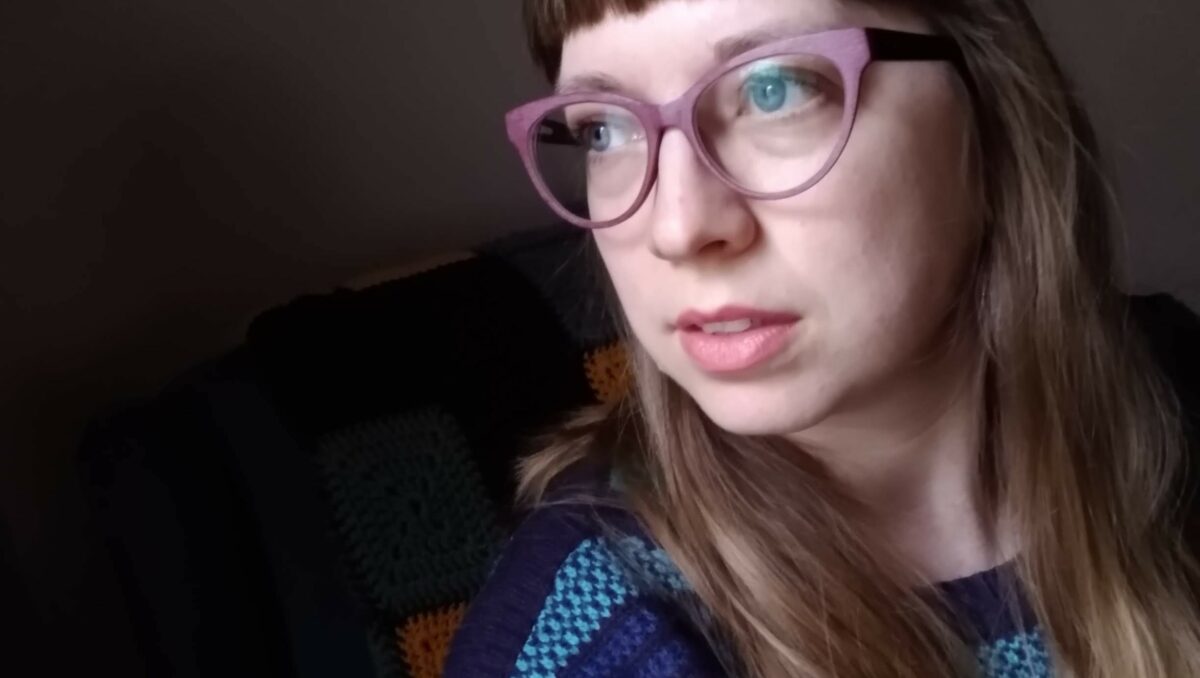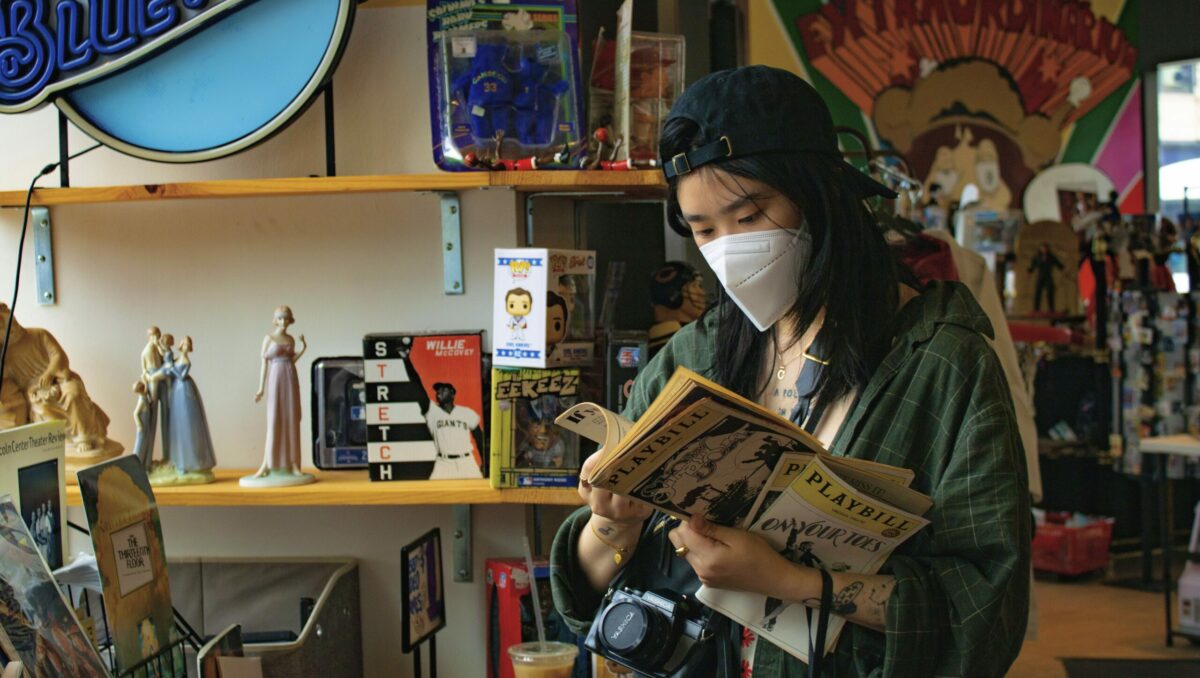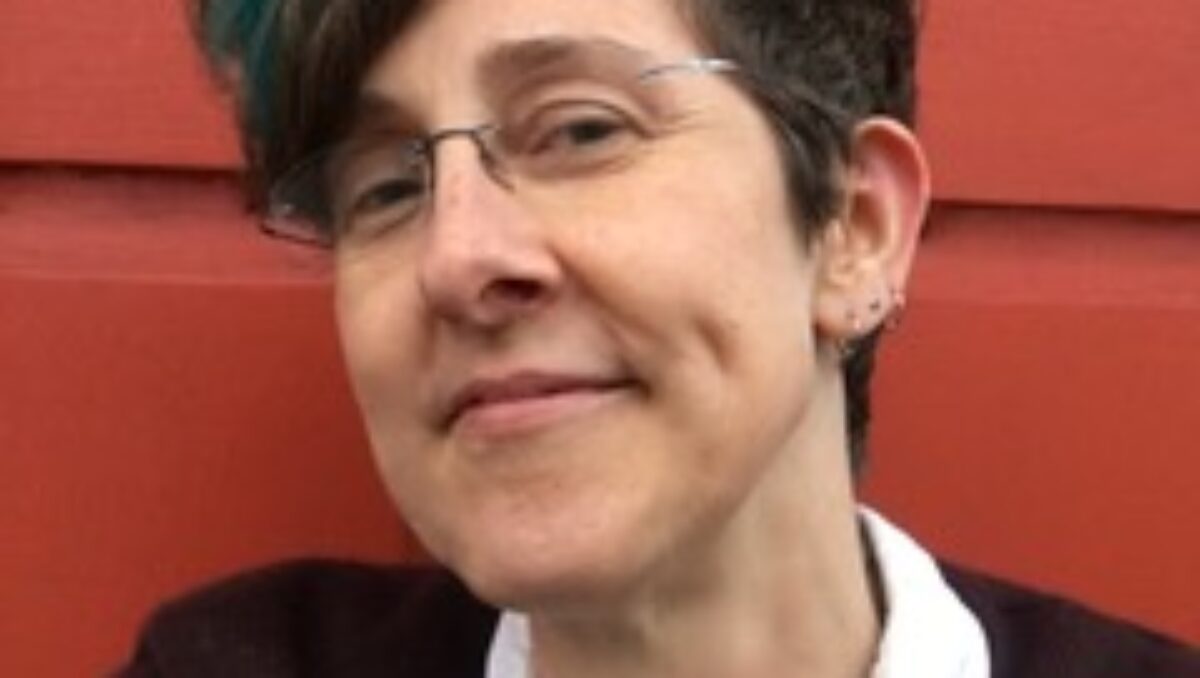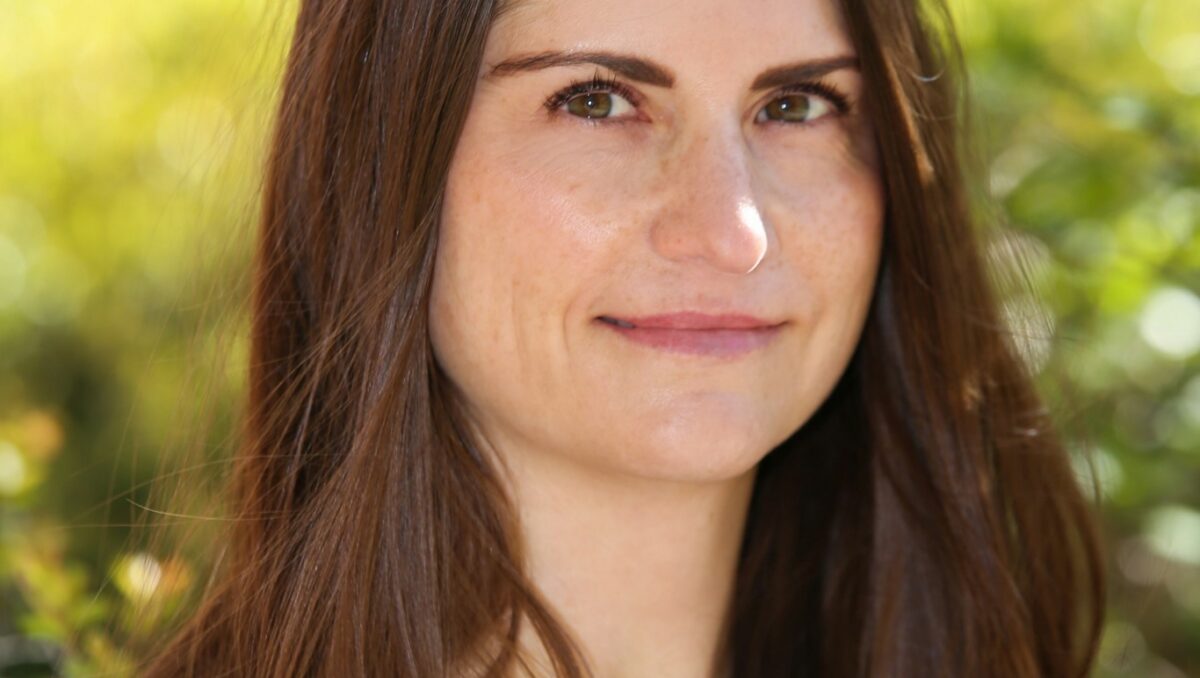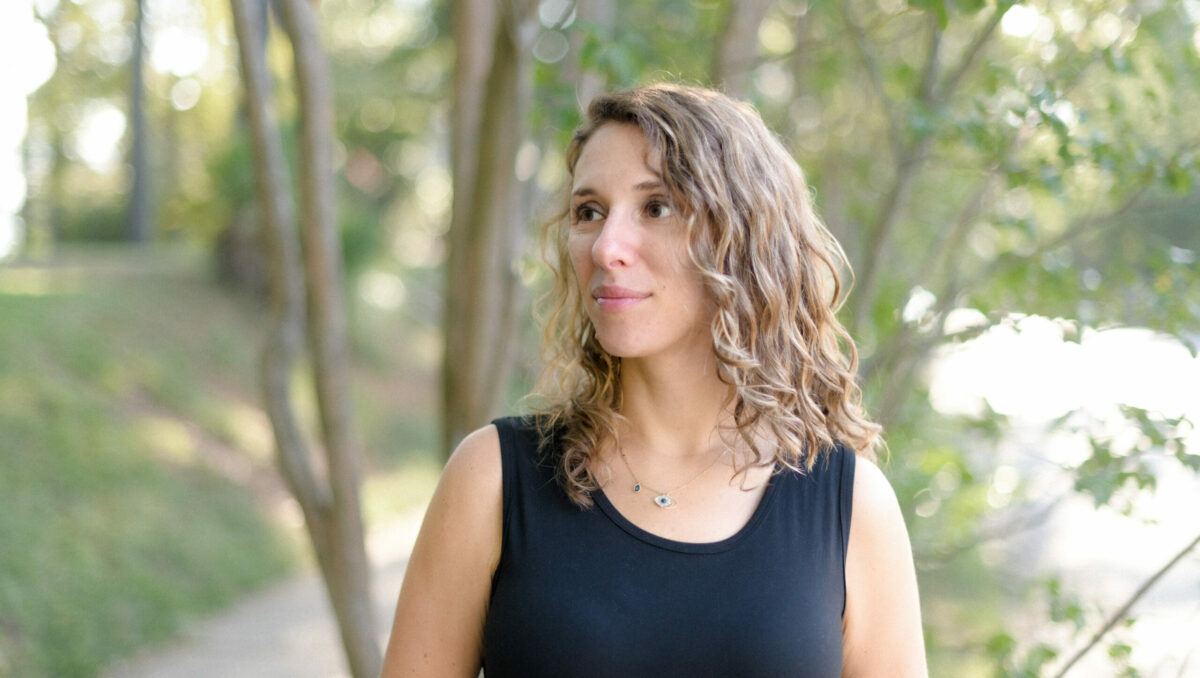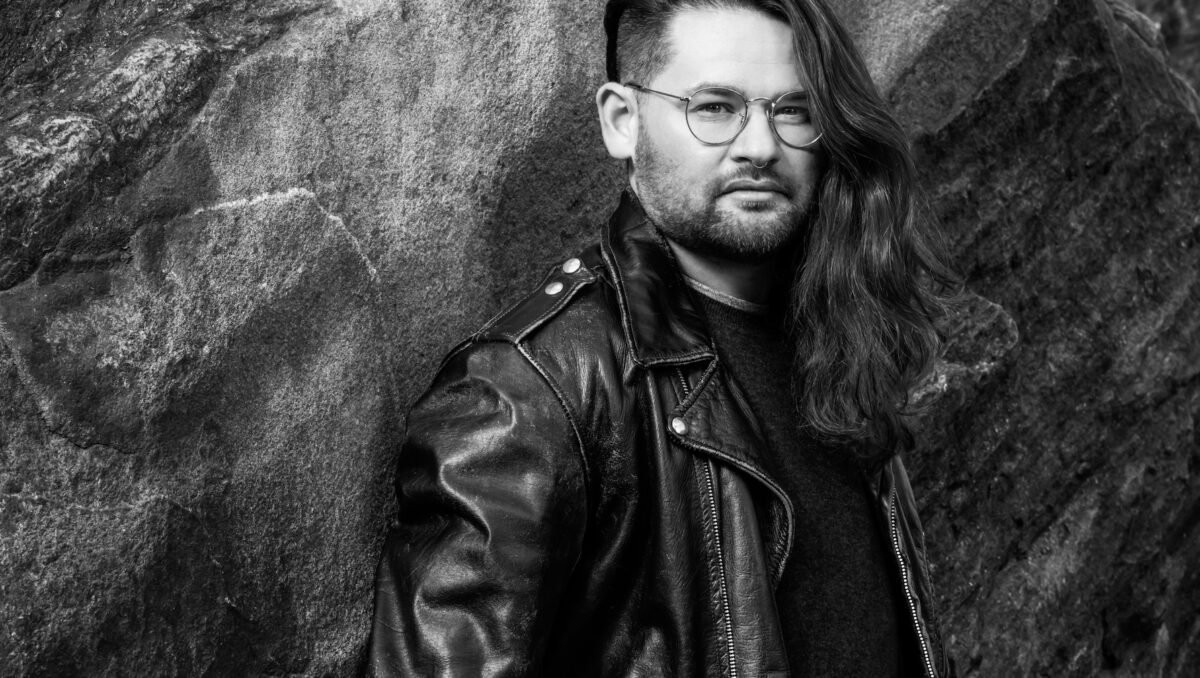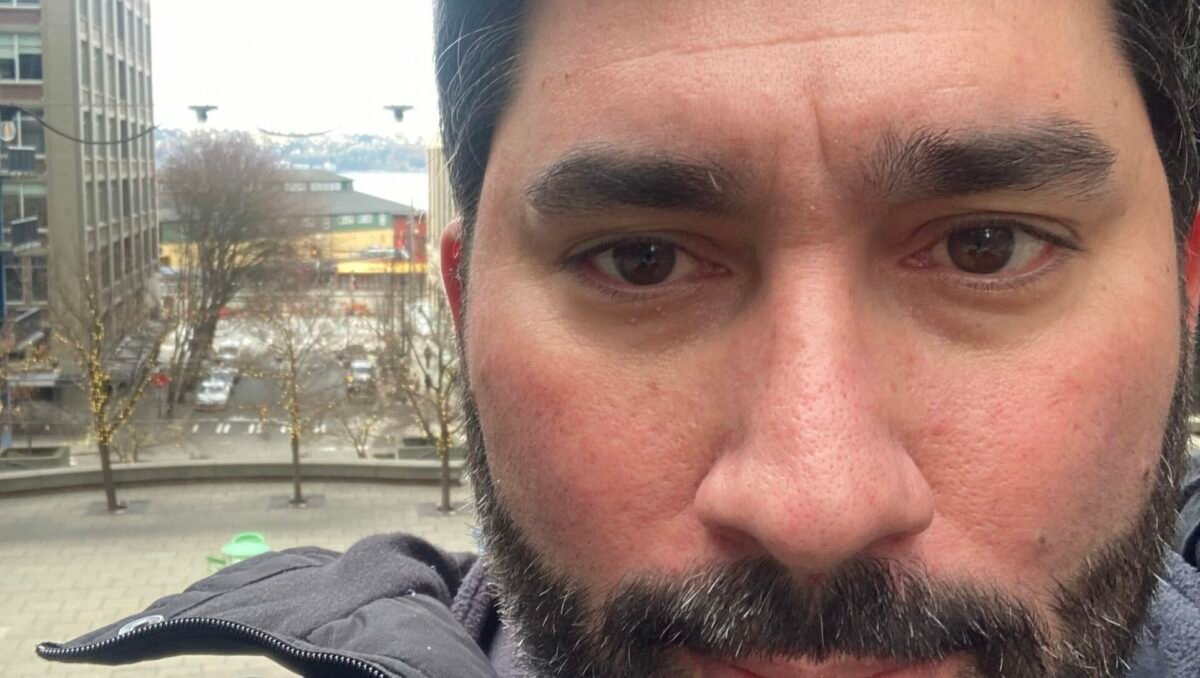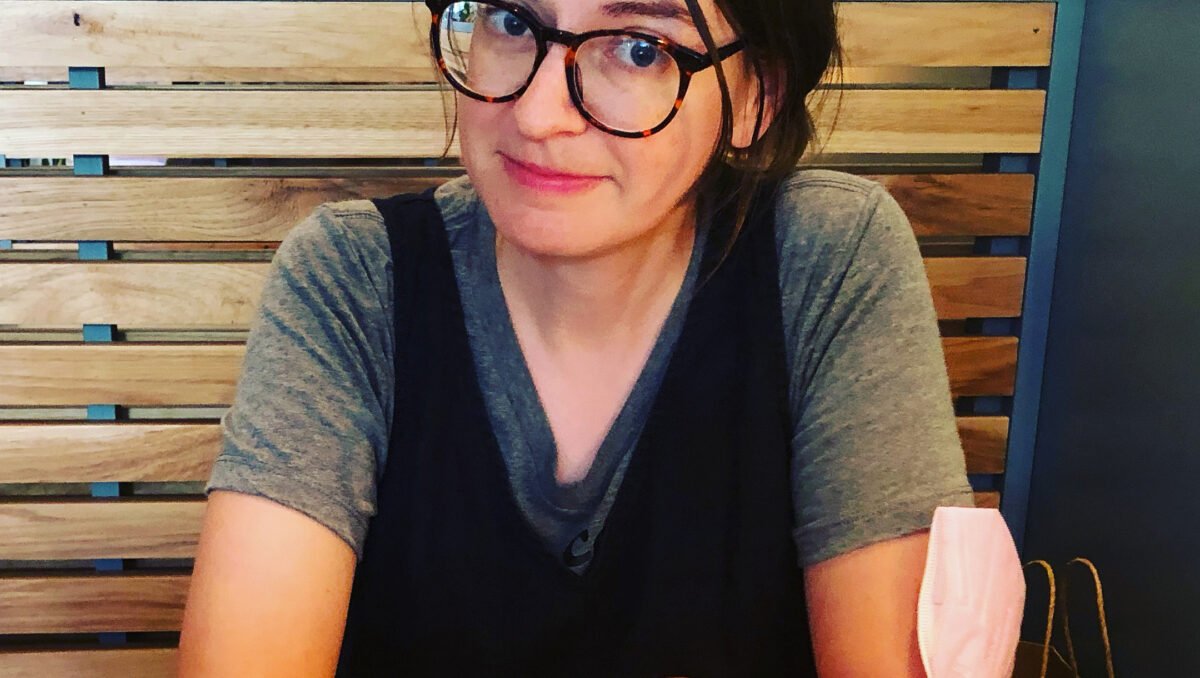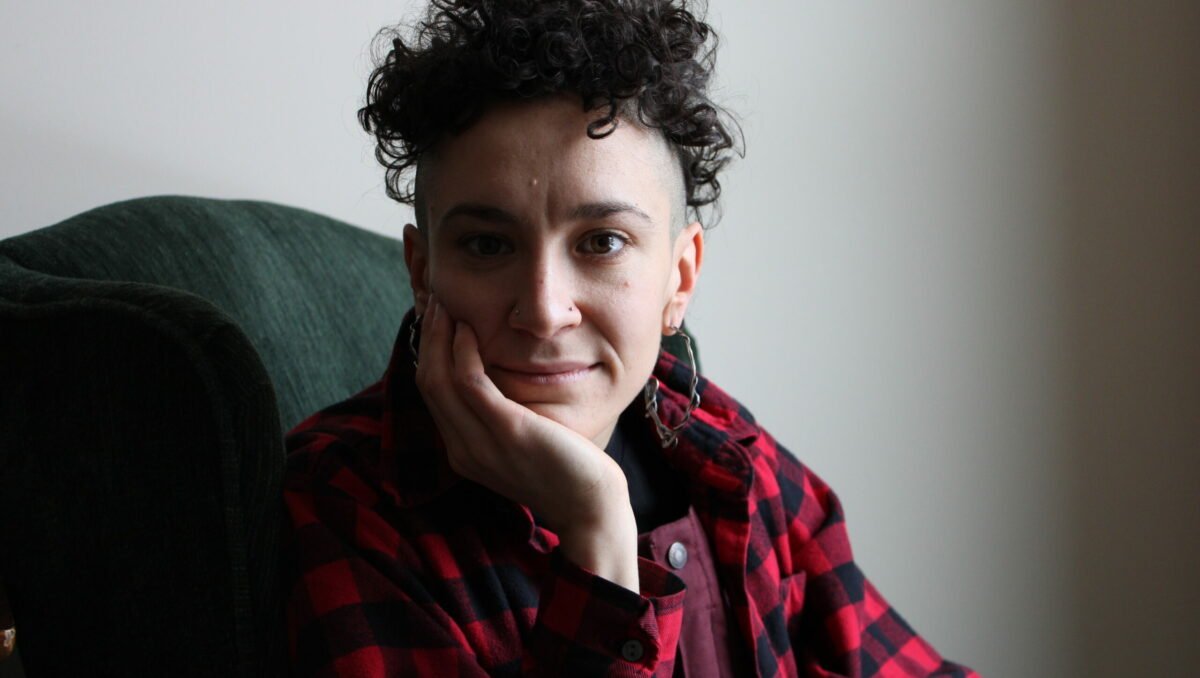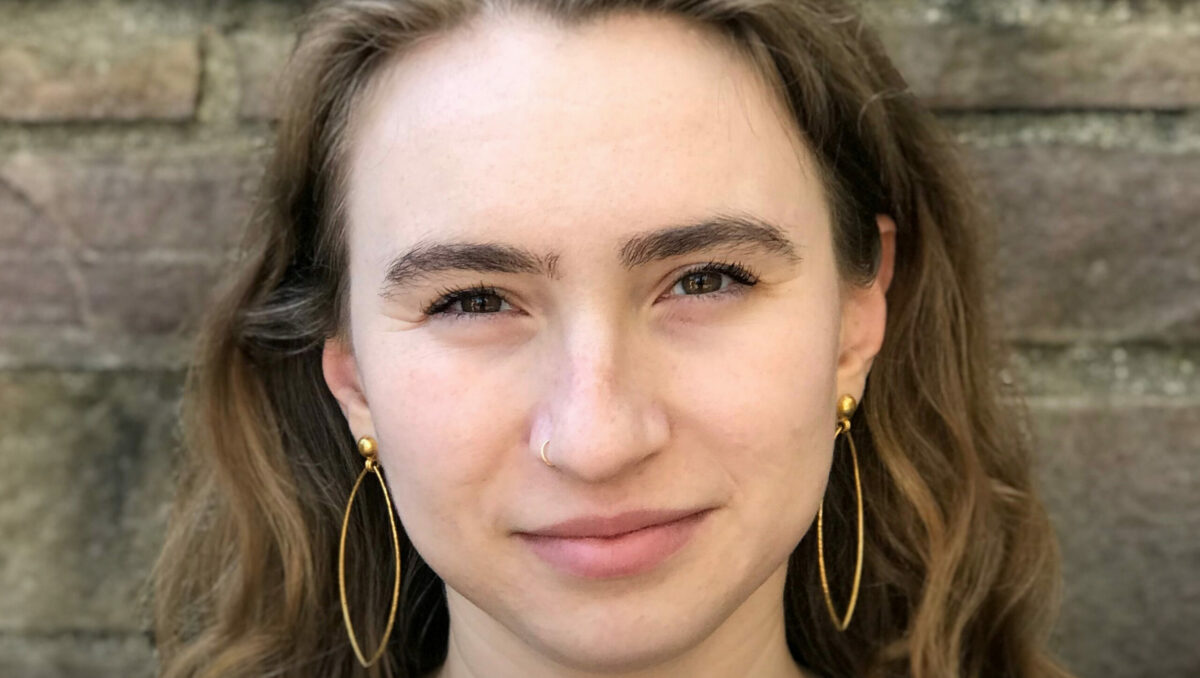TWO POEMS by Julia Thacker
Aubade
My ghosts line up, mouths full of bitter
greens and sweet grasses,
names chalked on the walls
of ruined buildings, the night
smelling of their breath.
One wears a split lip,
saxophone-blown. Sometimes he calls
in sick. I am not your splendid harness.
Don’t wait up. What is sleep anyway.
Barnyard animals, goats and owls sleep.
Even the earth with its seeds and vegetables
rooting underground can rest.
The joists of the house squeak.
Like stuttering bells, pipes gurgle
all night. Frost sets a breakfast table.
Butter and milk, clatter of copper.
Watering can from which I wish
to be poured. What can I do
but honor the first silver
hair in the winter comb.
My soul wears a crown of milk thistle and woolly-heads
Sometimes she is buried at sea,
wrapped in linen, the waves like mouths
of glass. Sometimes she rises again.
Mollusk-pearled, she strolls the village
dripping kelp. Called Pink Star,
Himalayan, Celtic, Diamond of the Dead
Sea, she does not answer to those names.
No hymn, no pilgrimage, no wafer
on the tongue. She eschews hallelujah.
Refusenik of frankincense and myrrh.
Sometimes she claims she’s just off the boat,
amnesiac. Takes the name Augusta Agnes.
Washes her unmentionables
at the sink. Bleaches her mustache.
Vagrant Sundays spent rolling in hay, tan,
sun-warm, indistinguishable from dry grass.
No bathing costume, swims in her drawers.
Wades in cranberry bogs. Eats tomatoes off the vine.
Sleeps on the beach. Sand makes a dune of her body.
At church bazaars, she filches Chesterfields
and barters for lace mantillas. Disappears for days.
Ignores my pleading letters penned in blackberry ink.
Neighbors say I should keep her on a leash.
She restoreth. She maketh still. She doth thirst.
JUNCTURE LOSS by Liane Tyrrel
Tiny words, real but illegible.
The dog finds a small dead body and nuzzles it with her nose.
Sometimes the petals of moon flowers tear as they open.
A linguistic change is called a juncture loss.
And here you’ll have to use your imagination because I’m not sure.
Back then we grew mock orange in the yard.
At first I didn’t think I would continue.
Everything including the walls had been stripped bare.
We say exact whereabouts when we really want to know.
I was carrying it in a wagon and bringing it back home with me.
I had visions of log runners driving logs down rivers.
Gravity affects us and we age.
I know I use too much honey in my tea.
Trust is an arrangement.
Who decides light?
FABLE IN WHICH YOU ARE A BARN ANIMAL AND I AM A CARNIVORE by Hannah Marshall
Suppose, you say, it began with the chickens,
the way one wing raised
could unbalance,
the way they learned
to tilt their heads
in a concession to gravity, all at once.
Yes! I like it, I say.
The pleasure of synchronicity.
The pigs, being dominant
in cognition, would be next.
They might listen to the rain
and learn rhythm
from the downspout.
Music, it seemed to you,
would be a matter of curled tail
and the scent of hay.
The cows would sing, without
meaning to.
I am entranced now: And the dark star
on the forehead of a pregnant heifer
would pulse, and she would moan
the river into the valley.
You think this lovely, but obtuse.
You say, All night long, the fireflies
make love to the mist,
and in the morning,
I interrupt,
the fox carries the music away,
warm between her jaws.
WHEN BILLIE HOLIDAY SANG by Grace Kwan
I’m gonna love you like
nobody’s loved you
with the rain flickering
against my parted window
and the sheets pooled
around my hips was when
I felt the first note
at the bottom of my stomach
that suggested it wasn’t
the bottom and there was more
mystery to fall through
than I could imagine
perhaps less the bottom
of my stomach than
the precipice of my stomach
and my first thought was
to reach for your wrist.
It occurred to me after
the party that things like
walking out of a party
with someone you just met
holding hands along a moonlight
river was an inaccessible romance
vignetted by searchlights
chased by people
I didn’t understand
with no hope of
participating in desire
until Billie Holiday
sang that note.
Everything I have is yours
you’re a part of me
what is it about her
voice that cleaves
the octave like an ocean?
my destiny so ardently split?
I think I understand
how you “love
music” without interrogation
as to genre or poetics
or school of thought
just the experience
of living from note to note
each breath lasting only as long
as it sustains the next.
ELEPHANT by Julien Strong
Something so heavy with meaning
all we can do is drag
our hands across the surface
itching to define to fix
as a compass point
navigating what
I thought I understood
because I lived within its skin
and yet
stroking the trunk
fingering a fold
I understand nothing
not even the shape
let alone the name
even the tracks it leaves in its wake
keep changing
and look
in each depression
the falling rain
becomes sea
TWO POEMS by Tana Jean Welch
SLEEPING WITH JANE
Again I mutate as we move through
the old park, ready to launch
past the spectral-fired flowers,
past the Japanese elm sighing
alongside the swarm of Jizo statues,
bald little monks tall as wine bottles,
each transmitting a silent symphony
of grief—Jizo, protector of unborn babies.
Jizo, an army of stone guardians
stalwart in cardinal colored caps
and bibs—I rise above the remains
of my never known, not a phoenix,
but a woman without memory, not
a man on his endless knee to the night,
but a woman with a woman living in one
minute you undressed me and led me
into the pond and despite the angst of algae
between my toes I knew I was safe, like
a child who lives no longer, a child smuggled
into the afterlife in the sleeves of Jizo’s robe.
JANE COMPLAINS
about losing wall space to Zina and Heike,
she wants a new glory hole, maybe something on Post Street—
when she’s angry her voice is clanging
bangles over a thin arm, so I hear new glory hole instead
of new gallery and wonder if it’s mine or hers
that’s suddenly inadequate
but before the wrinkled page of the sky
swells with emptiness,
I decide to let her know:
things can always go differently
Emma Bee Bernstein committed suicide
inside the Peggy Guggenheim Collection on the Grand Canal.
She was 23.
Where did she do it?
In front of Léger’s Men in the City
(purchased by Peggy the day Hitler invaded Normandy),
or next to Brancusi’s Bird in Space
(acquired as the Germans approached Paris),
or in the garden? Was Emma Bee
standing on the gravesite of Peggy’s 14 beloved Lhasa Apsos?
And how?
I can’t find this information anywhere.
Jane asks: what does this have to do with anything?
everything (the last dog died in 1979)
and nothing (her name was Cellida)
WHY HAVE CHILDREN WHEN THE WORLD IS ENDING by Julia Kolchinsky Dasbach
Killer whales have stopped reproducing.
Polar bears are eating their cubs.
Koalas abandon their young. Breathless,
nose low to the brush to keep
from choking on rising smoke,
they run towards the thousands,
pounds of food we airdropped
where earth stopped burning or
flames just hadn’t reached yet,
guilt for our part in this end
or fear it would come for us
the same. We tell ourselves
everything just wants to survive.
Believe in life as circle, not line.
In Karma, if it means our endurance.
We spread stories about wombats
herding animals into their burrows,
kangaroos hugging their rescuers,
or foxes feeding baby bears
uncharred, canidae milk. But animals
know to rely on no one. Their own
scathed hides and carcasses pile
the roadsides along bus routes
to the local preschool. The children
we chose to have must fight
gagging at the smell. My infant
daughter screams at us
for plunging the bulb syringe
deep into her nostril.
She exhales snot mixed
with my milk, screams
again, then sleeps.
She doesn’t know
we’ve made this quiet
possible. She turns her head away
where breathing comes easiest
and reaches for a warm body
as soon as she can smell it close.
She doesn’t know the coral reefs
are dead and sargassum reeks
in mounds along Caribbean coastline,
starfish suffocated under its spreading.
And maybe this is why
we’ve made her. Because
she doesn’t know survival
is in our hands, forgives us
their indiscretions, and lets us
hold her body as though
it were a world
we could still save.
TWO POEMS by Sebastian Merrill
inverse twin, lost sister
I.
Like our dead, you live in memory:
our grandmother’s clouded eyes
saw you instead of me. In the cold,
my bones still ache along your long-healed
fractures. I’ve spent years distancing myself
from you, but here, in our grandparents’ home,
I want to pull you close. When the spring
snows melted, I left my apartment in the city,
headed north through twisting back roads
over mountains, stopped to pee, squatting
behind bushes, until finally I arrived here,
on this Maine island. The cottage still
overlooks the rocky coast. Every dawn,
I paddle through the wind-whipped waves
of the Thread of Life ledges, those jagged
rocks the seals love. I find wonder
even in the swirls of floating plastic:
deflated balloons, grocery bags, forlorn
shoes. Do you remember the summers
we spent here? The swimming lessons
in the frigid water, the sea stars
in the tidal pools?
My grief for our grandparents
has grown without you. Also,
all the sea stars have disappeared.
II.
Where do we converge,
overlay each other
like a poorly developed film,
our two images a blur of light and form?
Where and when
do we divide?
III.
Every Sunday I pierce my thigh
with the silver fish of a needle.
Is this what separates me
from you?
I inject testosterone synthesized in a laboratory,
made from soybean and yams.
Like magic, it’s difficult to believe
this exhilaration of hair
on my face and chest
comes from plants.
When I thief myself out,
I am halted by mirrors: this beard
that grows miraculous
and strange.
Persephone, am I the pomegranate and you the seed?
I have no answers.
I possess a tongue, maps,
night. Am I an arrow
from hell? An impossible
bending spoon? Estranged
in this new knowledge
of the earth and the starless
rivers that run beneath,
I can no longer return
to how I was before.
You swear that without me,
winter. But did I choose to hide
the sun from the sky?
Frozen, the ground cracks
with questions. I am still
tossing, pulled between two
worlds. It’s hard to believe
this same sun still rises even
after we were ripped apart.
LAND ACKNOWLEDGEMENT UNSONNET by Dante Di Stefano
I am thankful for the acres in the inches
a poem makes on the page of its saying.
Like in this one, there is a large meadow
with a long table in the middle of it,
and seated at the table, every friend
and ancestor I could ever invoke
turns their faces to me and mouths the words
of a pop song from thirty years ago.
I am thankful that this image does not
unmake itself in a cloyed nostalgia.
Instead, I turn to you, my dear reader,
and say apple and flannel and snow
falling on the trees cut down to produce
parchment and draft and fraudulent treaty.
SO MANY by Robin LaMer Rahija
beautiful things lived here.
That small boned bird that glowed in the understory.
That big wide mushroom that was underneath us that whole time.
That elm the autumn of the drought when the leaves fell before they changed.
I stood under a field of green on a field of green on a field of green.
I understood then. There is no need to hurry death forward.
TWO POEMS by emet ezell
|
SOUTHWEST OF BABYLON surely the ewe lambs, ramming their heads into their mothers’ tits, can show me how to pray. i have been following their belched bleating across hilltops, me and my diet of dates. walking. stopping. grazing beneath an olive tree. stone by stone we make our way. i wanted to know where home was— i pulled the hot sand through my fists. vanity, vanity. desperation in the belly, mint leaves in the teeth.
|
|
FOLLICULAR PHASE OF A SNAKE each day the maude colored turtledove comes to her nest. divot of twigs and stone. around her eyes are rings of dark, red flesh.
i lay the swollen meat of my body in the sun and pray for a woman to bury me. she will not come.
only crows and their beady beaks. it was a past life, one of empty tombs and resurrections.
here, amidst seasons of exile, i mother god. desperate, dependent— a howling newborn strapped to my back. we are in a field of mustard. green and yellow stems. i nurse god with four cups of wrath and three types of blood: the same way that god nursed me.
unravel the snake from within my jaw. the snake clumps out my mouth. the price of cruelty, the thrill of my god-broken ribs. i send the snake out for the eggs in the nest, the same way my mother taught me. |
TWO POEMS by Sasha Burshteyn
COSMOLOGY
Cold hands—warm torso—
time like an orange—
time like a bag of salt
gray oxen drag—
How many years of salt?
Then, one day, a shell.
And fire, where joints should be.
A field of rose, a town
of anthracite, river of milk—
a face that hisses, sizzles—
girls who sort potatoes in the dark—
I orient myself by smell.
Memory blooms in the stone like a rose.
Its fiberglass insulation burns.
ZAVOD DIAFOTO
The face of history is sweating.
Her cheeks stretch
under a white kerchief.
Hills of wheat hum
dark against the horizon.
Women work the sugar beet
into crisp monochrome.
Women sit like sand (uncolorized).
Swamp fields of hemp.
Salt hills on the shore.
Men merge with their standing—
more pitchfork and spit.
They photograph her body—
no record for the state
of her arm, the corn,
our rippling hand.
I interpret dutifully: Academic
in the field, squints at heat.
The cleft in his chin speaks
to the clefts in the wheat—
a well-worn association.
- 1
- 2
